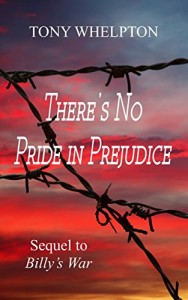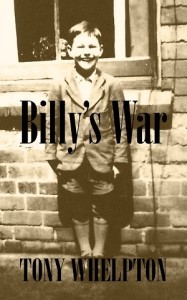Tony Whelpton
 Tony Whelpton has been writing for a long time – in fact he has been doing many things for a long time, because he celebrated his 85th birthday in January 2018!
Tony Whelpton has been writing for a long time – in fact he has been doing many things for a long time, because he celebrated his 85th birthday in January 2018!
He has always lived in England, but has a strong emotional connection to France, and has pursued a number of different careers: for a long time he lectured on French language and literature in a university; for even longer he was one of the UK’s most experienced and most influential examiners in both spoken and written French; between 1979 and 2000 he was a best-selling author of French textbooks for schools and colleges; he ran his own publishing company for 16 years, as well as editing newsletters of all kinds, singing for 30 years in a choir with near-professional standards, and doing a lot of broadcasting too.
Eventually, at a time when most people retire gracefully, he embarked on a new career which he now realises he should have embraced much earlier in life: writing fiction. He published his first novel at the age of 79, the second appeared a year later, and the third a year after that. At the time of writing (February 2018), he is hard at work on writing his seventh!
Tony loves literature and the theatre, sport (he played squash until he was 63, then tennis until he was 73 – but two hip replacements and a new knee have put paid to that!), classical music, cooking, and the pleasures of family life: his wife, three daughters, five grand-children and two great-grandchildren keep him pretty busy – but fortunately not too busy to write! (If you read earlier versions of this, you might be wondering what happened to his two cats. Sadly, they have both passed away, but both lived to a great age, one to just over 18, and her twin sister to well over 19!)
All Tony’s novels are classified as ‘Literary Fiction’. Don’t allow this to intimidate you! Anyone who has one of their novels available on Amazon is obliged to classify it according to Amazon’s own list of categories, which is Tony claims is almost as difficult to do as to write the book in the first place. At one point he chose to categorise one as ‘Psychological fiction’, because it dealt with racial prejudice, and racism is primarily a question of mental attitude; but Amazon then presented it as ‘Thriller and Mystery’, which it was clearly not! When Tony writes a novel, he always goes for an interesting story involving interesting characters, and he endeavours to write both elegantly and clearly; this is what prompted him to choose the ‘Literary Fiction’ label. But many writers of literary fiction are indeed elegant in their use of language, but far from clear, and such writers sometimes give the impression that they are more interested in showing off their language skills than in telling a good story. Tony is not of their number; in fact he maintains that any author who writes in such a way that the reader is more aware of the language than of what the language portrays is not a genuine story-teller, and a story-teller is what Tony wants to be!
How long will Tony carry on writing? It is impossible to say, but he intends to write until he can write no more. Two things above all keep him going: his long-held belief that life is there for living, and the thought expressed by the great French cellist Paul Tortelier, that “everybody should die young – but as late in life as possible”!
A Change of Mind (Literary Fiction)
 Maurice Summerfield was an old man, a very old man indeed, who boasted that he ‘could remember his ninetieth birthday as if it had happened only yesterday’. He was also something of a celebrity, having been a popular broadcaster for many years, a lecturer at both Cambridge and Oxford, and, in between those two academic phases of his life, he had spent ten years as a Member of Parliament.
Maurice Summerfield was an old man, a very old man indeed, who boasted that he ‘could remember his ninetieth birthday as if it had happened only yesterday’. He was also something of a celebrity, having been a popular broadcaster for many years, a lecturer at both Cambridge and Oxford, and, in between those two academic phases of his life, he had spent ten years as a Member of Parliament.
But, despite his undoubted success in a number of spheres, he came from a very modest background, his father a coal miner and his mother a factory worker in the East Midlands; as for his brother, the less said about him the better…
Maurice, however, was rather less impressed than others by what he had achieved, and when, in his early eighties, he found himself stricken by a speech defect so appalling that this arch-communicator was transformed into a gibbering wreck, he became convinced that the underlying cause was low self-esteem; the first hurdle he needed to cross in his quest to rediscover his fluency of speech was to persuade other people that someone so outwardly successful could possibly be suffering from a crisis of confidence. Fortunately he had a formidable ally in his loving wife Elaine…
Feed A Read Amazon UK Amazon US
Billy’s War (Literary Fiction)
Billy’s War is the story of little Billy Frecknall. The date was Thursday 8 May 1941. Billy was nine years old, and Britain, the only country in the world actively engaged in resisting the influence of Nazi Germany, was being subjected to nightly bombing raids which saw hundreds of homes destroyed and thousands of people losing their lives, especially in London and the larger industrial cities. Billy’s home city of Nottingham had not yet been attacked, but that situation was to change that very night.
What could being at war mean to a nine-year-old? A great deal, not least being the fact that Billy to all intents and purposes no longer had a Dad, because his father had enlisted in the army in the early days of the war, as most men under 35 had, and they didn’t even know where he was.
That night saw the biggest air raid Nottingham had experienced, and there were many casualties, including Billy’s Mum. Billy survived, but finding his Dad became even more urgent than before. His obsessive quest led him into many adventures and a great deal of danger, but Billy was a feisty, determined boy, and his courage never faltered. Eventually, after being treated callously and cruelly by relatives who were supposed to be caring for him after the death of his mother, he decides to act.
Fortunately Billy was a cheerful, intelligent, resourceful boy with the gift of winning the hearts of most people he encountered, and the spirit of the beleaguered British people at that time was such that they were always ready to help someone who was in need of help.
The air raid on Nottingham is a historical fact, but the remainder of the story is fiction. The author was one year younger than Billy Frecknall at the time, and remembers that night vividly; he lived a couple of miles away from Billy, but he and his sisters sat with their parents, petrified, listening to the bombs screaming down and exploding when they landed. Twenty-three people were killed in Billy’s street that night, in a supposedly safe air raid shelter. In recognition of his own good fortune which contrasted with the ill-fortune of those victims, Tony Whelpton dedicated Billy’s War to the memory of those twenty-three people.
But despite the tragedy this is ultimately an uplifting story, which pays tribute to the resilience of the human spirit in the face of adversity, and Billy Frecknall is the symbol of that spirit. He will undoubtedly win your heart too, as he has done many others!
Feed A Read Amazon UK Amazon US
There’s No Pride In Prejudice (Literary Fiction)
 The first thing to say about this book is that it has absolutely nothing to do with Jane Austen! The title comes from a statement the main character makes, expressing an idea which he adopts as his motto throughout his distinguished life.
The first thing to say about this book is that it has absolutely nothing to do with Jane Austen! The title comes from a statement the main character makes, expressing an idea which he adopts as his motto throughout his distinguished life.
This character is Billy Frecknall, the little boy we first met in the highly popular Billy’s War. He is already approaching his twenties when we meet him again in There’s No Pride In Prejudice; upright, honest and bold as ever, he is, however, perhaps a little on the naïve side – at least to begin with.
While studying in Paris, however, he forms a romantic attachment with Sarah, a French girl with a Jewish background; when he hears the story of her Second World War childhood, and witnesses the anti-semitism which is still prevalent in France more than ten years after the end of the Nazi occupation, his eyes begin to be opened.
A few years later, in the USA, he experiences the effects of racial discrimination and the operation of the ‘Jim Crow’ laws, when he falls in love with Susannah, a black girl with a beautiful voice, who is destined, like Billy, to become an international opera star. From that point on, he determines to make the most of his growing fame and influence, and devote his life to fighting prejudice and discrimination of every kind and wherever it occurs.
Despite its serious theme and its occasional dark moments, There’s No Pride In Prejudice is a story full of fun and hope, suggesting that, with a determined effort, the opening statement of the 1776 Declaration of Independence, ‘We hold these truths to be self-evident, that all men are created equal’ – with which Tony Whelpton’s novel is prefaced – may yet become reality.
A Happy Christmas(Literary Fiction)
 “A heartwarming story…” “A delightful story…” “Wow!!! This was an amazing book!”
“A heartwarming story…” “A delightful story…” “Wow!!! This was an amazing book!”
Who would have expected poor old Wilf Broadhurst to have a happy Christmas in 1986? Certainly not his doctor, whose only recommendation is that he should get out more – perhaps he might get a dog, start going to church, or even start going to the pub!
Why was Wilf so unhappy? His wife had died the previous year, he lives alone, he has virtually no friends or family, and he lost touch with his only daughter nearly thirty years previously, as a result of a family dispute which broke his heart.
And yet this story is wonderfully uplifting, not depressing! In fact it is exactly the kind of story everybody needs at Christmas, for through a combination of determination, resourcefulness and a little bit of luck – not forgetting the contribution of Boots, his little dog – Wilf defies all expectation and enjoys his best Christmas for years! You will enjoy reading how his life was transformed!
The Heat of the Kitchen (Literary Fiction)
The Heat of the Kitchen is a fast-moving, exciting story: Saint-Pierre-sur-Loup is a little town in the south of France, a popular tourist destination, but with a notorious problem – perpetual traffic jams.
Alain Simondi is Mayor of the town, whilst the leader of the opposition on the Town Council, Cécile Delpech, is an attractive single mother – who is much closer to the Mayor than her political status would imply.
Simondi’s proposals for building a relief road split the town, and tempers run high, especially when adverse reports start to appear in the regional newspaper, at the hand of a pretty, young, feisty woman reporter, Hélène Gautier, who has caught the compulsively roving eye of the Mayor.
Who will gain the upper hand, Simondi or his critics? Whose dirty tricks are the most effective?
In a part of France where the heat can transform a traffic jam into a murder scene, and the police, supposedly under the control of the Mayor, are not to be trusted – especially, it seems, when faced with an endemic drug culture among the young people of the region, the heat of the political kitchen is even more intense.
Readers will be attracted by the unexpected twists and turns of the plot, and the more environmentally aware will be intrigued by the ecologically friendly solution to the traffic problem which the author proposes – a solution which is not really utopian, for elements of the plan really have been introduced in a number of towns in both France and Italy.
The author has used his familiarity with, and love of France and the region where Saint-Pierre is situated, to create a fascinating and authentic portrayal of how French local politics work – or might work if this were not a work of fiction. (In fact a number of French readers assert not only that this is exactly how French local politics work but that the author must have had their village or town in mind, because their Mayor behaves in exactly the same way as Alain Simondi!)
Feed a Read Amazon US Amazon UK
Before the Swallow Dares (Literary Fiction)
Before the Swallow Dares is a story about a group of English people who are well beyond the first flush of youth. Surprisingly, therefore- but it is only surprising for younger people lacking in imaginatiion, the author claims – it is also a story of lust, jealousy, frustration and guilt as well as true love and friendship.
Ted Bryant and Jim Fletcher meet by chance in a bar and get into conversation; after a while it dawns on them that they were close friends back in their schooldays, and have not seen each other for nearly fifty years, and they arrange to meet again and renew their friendship. It is not until he is on his way home, however, that Ted realises that Jim’s wife, Dilys, is none other than the girl he made love to when they were both seventeen, and who disappeared from his life shortly afterwards with no word of explanation.
The planned reunion takes place none the less, and the two couples become firm friends, even spending two weeks together in a villa in Provence. But all is not sweetness and light, and the plot follows a number of twists and turns before the final resolution is reached – partly, but not exclusively, as a result of the appearance and maverick behaviour of Ted’s French ex-wife, the passionate, intense and attractive Arlette.
But if the behaviour of these ‘senior citizens’ is quite different from the stereotypical norm, this does not mean that they are immune to the discomforts and disadvantages more normally associated with advancing age. Before the Swallow Dares is a book, the author asserts, which needed to be written, for it gives a much more balanced view of the way elderly people feel and think. Who better to present that view than an author who was already in his 80th year when he completed the book!
The title of the novel, a quotation from Shakespeare’s A Winter’s Tale, hints at the precocity of youth; the moral of the story, if there is one, is that the results of such precocity do not necessarily disappear once youth is past.








